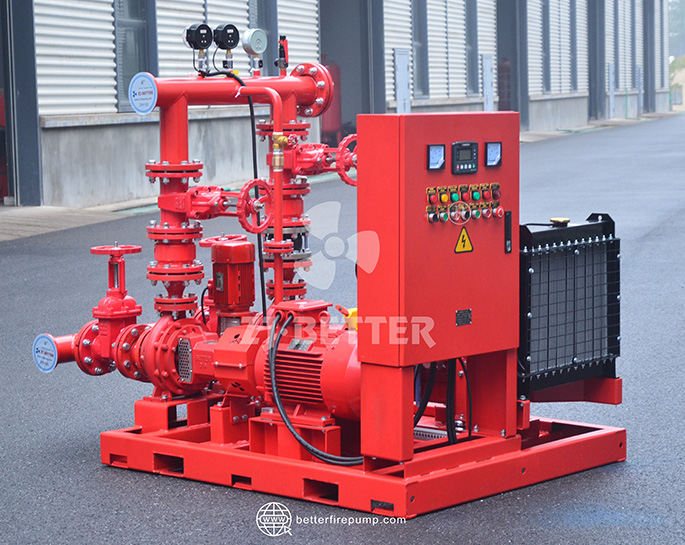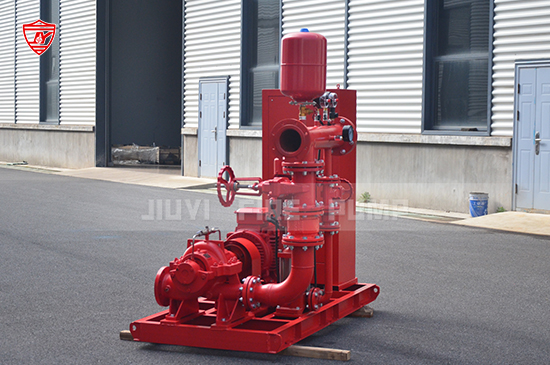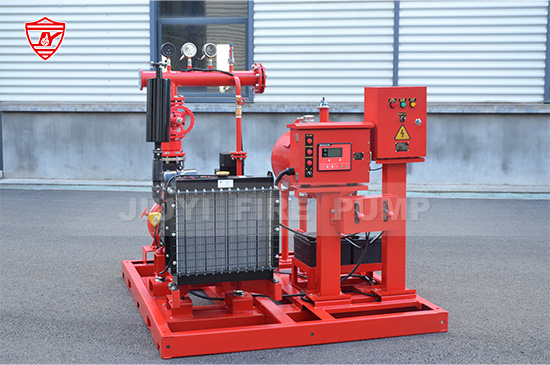In the world of fire safety, every component of a fire protection system must work seamlessly to ensure lives and property are safeguarded during emergencies. One of the most crucial yet often overlooked components is the fire pump controller. Whether you're installing a new fire pump system or maintaining an existing one, understanding the role of the controller is essential.

What is a Fire Pump Controller?
A fire pump controller is an electrical control system designed to start, run, and monitor fire pumps during fire events. It receives input signals from sensors or alarms and commands the fire pump to activate when needed. Fire pump controllers are required by national and international codes, such as NFPA 20, which specifies performance and installation standards.
There are various types of fire pump controllers, including:
-
Electric motor controllers
-
Diesel engine controllers
-
Jockey pump controllers
-
Combined automatic/manual controllers
Each type is designed to match the specific needs of the fire pump it's controlling.
Why Is a Fire Pump Controller Essential?
1. Automatic Activation During Emergencies
In a fire event, time is of the essence. A fire pump controller ensures that the fire pump activates immediately when low pressure is detected in the sprinkler or standpipe system. This automatic response is crucial for minimizing fire damage and saving lives.
Without a reliable controller, the pump may not start or may start too late—rendering the entire system ineffective.
2. Compliance with Fire Safety Standards
According to NFPA 20 and other building codes, fire pumps must have controllers that meet specific requirements. A UL-listed or FM-approved fire pump controller ensures compliance with local and international fire protection regulations.
Using a non-compliant or outdated controller could result in failed inspections, fines, or worse—system failure in an actual emergency.
3. Seamless Integration with Alarm Systems
Modern fire pump controllers can integrate with building management systems (BMS) and fire alarm control panels (FACP). This connectivity allows operators to monitor pump status in real-time and receive alerts when the pump is running or if a fault is detected.
This integrated approach supports proactive maintenance and ensures any issues are resolved before they lead to failure.
4. Precise Monitoring and Reporting
Fire pump controllers come with advanced features like:
-
Event logging
-
Pressure monitoring
-
System diagnostics
-
Remote communication capabilities
These features help fire safety personnel monitor system performance, troubleshoot faults, and generate compliance reports for safety audits.
5. Redundancy and Backup Functions
For diesel fire pumps, the controller also handles:
-
Battery monitoring
-
Engine start cycles
-
Alarm conditions
-
Manual override operations
In systems with electric pumps, the controller manages:
-
Main power and backup power sources
-
Motor overload protection
-
Phase loss or phase reversal detection
In both cases, the controller adds a layer of redundancy, ensuring that even in the event of primary system failure, the pump will operate.
6. Manual Control Options
Although most fire pump controllers are designed to operate automatically, they also allow for manual override. This is particularly useful during testing or maintenance. In an emergency, authorized personnel can manually start the pump even if automation fails.
7. Maintenance and Testing Made Easier
Fire pump controllers simplify routine testing procedures. Many controllers come with built-in test modes that simulate fire conditions without actually discharging water. These tests verify pump readiness and help detect issues early.
Moreover, event logs help track when the system was last tested, what the results were, and whether any faults occurred during operation.
8. Longevity and Durability
Modern fire pump controllers are built for rugged environments. They are housed in enclosures that protect against dust, moisture, vibration, and temperature changes. A high-quality controller can last decades with proper maintenance, making it a sound investment in long-term fire safety.
Types of Fire Pump Controllers
Electric Fire Pump Controllers
These controllers manage electric motor-driven fire pumps and typically include:
-
Automatic and manual start options
-
Voltage and phase monitoring
-
Soft start and reduced voltage options
Diesel Fire Pump Controllers
Designed for diesel engine fire pumps, they control:
-
Engine start sequence
-
Battery charging
-
Fuel level alarms
-
Weekly test cycles
Jockey Pump Controllers
Smaller controllers that operate the jockey pump, which maintains system pressure and prevents false starts of the main fire pump.
How to Choose the Right Fire Pump Controller
When selecting a controller, consider the following:
-
Pump Type: Diesel, electric, or jockey?
-
Certifications: Is it UL listed or FM approved?
-
Compatibility: Will it integrate with your alarm or BMS?
-
Environmental Conditions: Will it be installed indoors or outdoors?
-
Ease of Use: Is the interface intuitive? Are manuals and support available?
Always consult with your fire protection system supplier or engineer to ensure the controller meets local code requirements.
Common Issues Caused by Faulty or Inadequate Controllers
-
Failure to start during fire conditions
-
False starts due to sensor misreading
-
Communication failure with alarm panels
-
Overheating or electrical short-circuits
-
No event logging for compliance inspections
Any of these failures can render your entire fire protection system unreliable.
Benefits of Partnering with a Trusted Manufacturer
As a leading fire pump manufacturer, we provide not only UL/FM fire pumps but also reliable and compliant fire pump controllers. Our systems are:
-
Tested for performance and durability
-
Engineered for seamless integration
-
Supported by comprehensive documentation and service
Choosing a quality controller from a trusted source ensures peace of mind—and in the fire safety business, that's priceless.
Final Thoughts
A fire pump is only as reliable as its controller. In emergencies, you don't get a second chance—your system must work flawlessly. Whether you’re building a new system or upgrading an old one, invest in a reliable, code-compliant fire pump controller to safeguard property and save lives.
Need Help Choosing a Fire Pump Controller?
Contact our experts to find the perfect controller for your system, whether electric, diesel, or jockey. We're here to help you stay compliant, safe, and ready for anything



